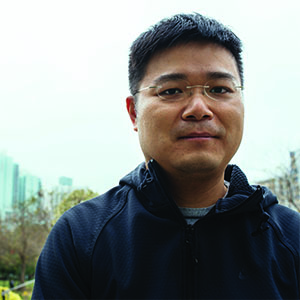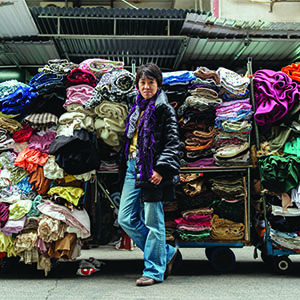The tales continue…
We ran highlights from our Tales of Sham Shui Po exhibition in last month's Urban Diary. In the June edition, we'll feature more stories from the show.
The world may not have the same children's books if there's no Sham Shui Po in Hong Kong. Sham Shui Po, a hub of fabrics and accessories, is where Teresa So Fung-chun used to frequent to source materials for tactile children's books.
Law Wai-kwong grew up in Sham Shui Po. In a city that is fanatical about development, Hong Kong has seen many old or even not-so-old shops and buildings disappear in recent years, while Victoria Harbour is getting smaller and smaller thanks to non-stop reclamation and an ever-changing shoreline. Yet for Law, one thing has remained constant: the view of Lion Rock from Sham Shui Po is still the same for him, just like what he remembers from his childhood.
As in the May edition, this time we'll have Robert Godden's portraits of our interviewees, while Urban Diary's photographer Tai Ngai-lung continues to bring us the most authentic scenes from Sham Shui Po.
The response to the Tales of Sham Shui Po exhibition has been overwhelming, both when we're showing it among Sham Shui Po kaifong at Tung Chau Street, and when we went to mix with the art-loving population in the vertical artist village of Foo Tak Building on Hennessy Road. Tales of Sham Shui Po will move to Wan Chai Pier between 20 and 22 June. On the opening night of 20 June, we'll be screening our latest documentary Tales of Sham Shui Po: Lai Sun Store at the harbourside venue.
A family business of 40 years, Lai Sun Store wasn't just any ordinary mum-and-pop store; rather, it's functioned as a popular public space for the Pak Tin community that it served. The end of the store also spells the end of that community that's built around it. Hong Kong has lost not just an old store, but also a precious public space and a community. Development that ignores the people it is supposed to serve is detrimental to Hong Kong's sustainability. Nate Chan, a literature researcher, captured the last few days of the store on film before its forced closure due to the redevelopment of Pak Tin Estate. Her documentary is a very worthy documentation of what often gets sacrificed in the name of urban progress.
See you at the pier!




